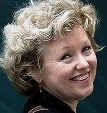By Divina Infusino
Sunday, March 18, 2012
The Big Red Light in a Writer's Head
By Divina Infusino
Friday, March 9, 2012
Social Media Marketing Changes Like the Weather

By Georgeanne Irvine
Social media marketing: it changes like the weather or perhaps more frequently. I recently attended a fascinating and informative Social Media Symposium hosted by Nuffer, Smith, Tucker, a San Diego public relations firm. I thought I would share a few of the nuggets I gleaned from the speakers and panelists—some of the material was new and other tidbits reconfirmed information that I already knew but probably needed to hear again.
From keynote speaker Jason Falls, author of “No Bullshit Social Media: The All-Business, No-Hype Guide to Social Media Marketing”
· If anyone tells you they’re a social media marketing expert, run—or order a pizza from them.
· There are no social media rules. Example: For those who say “you can’t sell anything using social media,” Jason called “Bullshit” and explained how during a winter snowstorm, a mechanic notified friends and clients through Facebook about his storm special—installing car starters. The guy got a lot of business because of the need and the timing.
· Strategic planning is crucial to any marketing plan. You also need to include mechanisms to measure the results.
· There are 7 basic business drivers. You must decide which are important to your goal before developing a strategic social media plan: 1. Enhance branding and awareness. 2. Protect your reputation. 3. Enhance public relations. 4. Build community. 5. Enhance customer service. 6. Facilitate research and development. 7. Drive sales.
· ROI measures only in dollars. A better question to ask in social media marketing: What do I get in return? (Only 2 of the 7 business drivers reflect ROI.)
· Being social is a part of business. We buy from people we know, like, and trust.
· Social media doesn’t raise money; people raise money but they can raise money using social media in certain circumstances.
· Give people a reason to follow you on Facebook and Twitter. Include “really useful content.”
From the panelists
· Social media is a marathon, not a sprint. The posts should stay on the message but each one doesn’t have to reach the goal right away.
· Hook people. Give them a reason to come back.
· Social media plays a role in the larger ecosystem of marketing and communications. It’s not a replacement.
· You need to respond to the positive social media comments in addition to the negative ones. The responses must be authentic, especially for your best customers. You must divorce yourself from emotion when responding to negative comments.
· The difference between good and great is consistency and execution.
· Content matters: everyone in an organization needs to be excited about the product so they can generate great content.
· In Website design, Flash is out and HTML5 is in. (I’m not a Web designer so I’m only repeating what was discussed at the symposium.)
· Make social media a part of an overall crisis communications plan.
· Social media is a main communications tool for media/the press.
From lunch speaker Gary Kim, editor of Mobile Marketing & Technology, Content Marketing News and Carrier Evolution
· We don’t know where mobile marketing will be in the next 15 years. Don’t panic, though, or waste resources on mobile marketing yet—we have plenty of time to figure it out.
· The future in mobile marketing will change dramatically, so watch where it’s going and keep it on your radar for now.
My biggest takeaway:
· A reminder that every project, campaign, or marketing endeavor doesn’t need every single social media tool applied to it. Remember to strategize, review the seven business drivers, know your audience, and plan accordingly.
San Diego native Georgeanne Irvine has devoted more than three decades of her career to raising awareness about animals and wildlife conservation. By day, she is associate director of development communications for the San Diego Zoo, where she has worked for 34 years. George is also the author of more than 20 children’s books, plus numerous magazine, newspaper, and Web articles. George’s most recent work is the coffee table book, The Katrina Dolphins: One-Way Ticket to Paradise, which is a true story about 8 dolphins from an oceanarium that were washed out to sea during Hurricane Katrina in 2005 and dramatically rescued a few weeks later.
Friday, March 2, 2012
When Research is FUN (and when it isn’t)
 |
| Kathi Diamant at the United States Botanical Garden, in Washington DC (part of the fun of research) |
I am sitting at Carrel #2, which consists of a little desk with a computer in the 6th floor Reading Room, surrounded by other researchers, who sit to the left and right of me, also typing busily away. I just peeked at the surrounding computers, and no one is playing Free Cell or looking at their Facebook page. Everyone is serious around here.
In fact, just to show how serious I am, I did research for this blog post, and just reread Georgeanne Irvine’s offering from last July, entitled “Methods to Get My Writing Juices Flowing.” Like George, my absolute favorite aspect of writing is the research phase. Omitting the “observing animals” part, I too enjoy “interviewing people, gathering and analyzing facts, searching for information, visiting sites, studying archives” as the most invigorating part of the writing process. Except when it isn’t.
But before I get into all that, let me first give a plug for grants.
Getting a grant to conduct the research you need to knowledgeably set the scene, whether historical, geographical, or cultural, is an excellent idea on several levels. Not to say writing a grant is easy, but it is doable. If you are in San Diego, spend an afternoon at San Diego Foundation at Liberty Station, and you’ll find hundreds of books filled with available grants in every subject imaginable. (If you are not in San Diego, you can look in similar facilities in your own city, and increasingly, online.) Make a list of those that could possibly apply to you, checking your necessary qualifications (like being a US citizen, or a certain level of education), application dates and other criteria, and then write a quick letter of inquiry. Not all will answer you in the affirmative, but chances are good, some will. Then apply, following the grant instructions to the letter. The most important tip I can offer is to read and re-read the instructions, again and again, before, during and after writing the grant.
Having received three grants prior to this one, I can attest to the value a grant affords (beyond the cash, which for me, has ranged from $2,000 to $5,000). When you are trying to sell your book, whether in proposal form or already completed, having received a grant establishes you as someone whose idea is worthy of support. It adds prestige, and acreage to your “platform” which as we are now all aware, is an author’s new best friend. And it can make your writing more descriptive, informative and accurate.
My current grant required a month’s residence in Washington DC at the Woodrow Wilson Center, which grants me access to all sorts of libraries, archives and experts. I have conducted a dozen interviews, and spent hours at the Library of Congress, National Archives and the research facilities at the US Holocaust Memorial Museum. I am taking copious notes, and searching out new sources of information, based on what I’ve just discovered. On my own time, I am conducting a different sort of research—specifically on the best restaurants in the historic Capitol Hill neighborhood where I am renting a room, and on which Smithsonian institution I like best. That is the fun part.
The not-so-fun part is the slog. The endless typing-up of pages of my unreadable scribbled notes, and the necessary follow-up of questions not fully answered. Analyzing what I’ve gathered and finding no conclusions, only more questions. Phone calls and emails that don’t get returned or answered. Being overwhelmed at the ceiling-high reams of information on one hand, and on the other, the dearth of details on what I really need to know. I could go on. But thank goodness, blog posts should not.
I’m in the midst of it now, but I know that the memory of the slog evaporates, while a grant’s gains can be immeasurably important, offering an opportunity to fully explore the story you want to tell. Despite my last paragraph, I heartily recommend you research one for yourself. And let me know if I can offer advice. The only thing more fun than gaining knowledge is sharing it!
Kathi Diamant is the author of "Kafka's Last Love: The Mystery of Dora Diamant" and the director of the Kafka Project at San Diego State University, where she is an adjunct professor. When she returns from her stint at the Woodrow Wilson International Center for Scholars, she will be preparing for her class "Kafka in Context" LTEU 130, at UCSD in the Spring, and her Magical Mystery Literary History Tour this summer.











